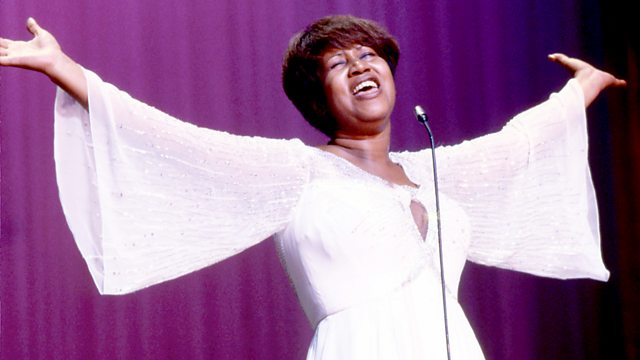
Paul Sexton charts Aretha's journey from gospel-singing schoolgirl to world-renowned queen of soul. Contributors include Elton John, George Michael and Dionne Warwick.
Radio 2 begins its Summer of Soul with Paul Sexton's two-part profile of the queen of the genre, Aretha Franklin. Broadcasting throughout August, the season will also profile the late singer Donny Hathaway; celebrate the cultural significance of the FAME Studios in Muscle Shoals, Alabama; feature singer Mavis Staples in conversation with Ricky Ross; and mark 40 years since the release of Marvin Gaye's ground-breaking and politicized concept album, What's Going On.
Very few artists can claim to have invented a musical style. Aretha Franklin remains too modest and understated to say so, but she played a major role in creating modern R'n'B, and her singing technique is still imitated by almost every 21st century soul performer.
The guest list of contributors across the two programmes shows the kind of esteem in which she's held by fellow musicians and admirers. We'll hear from Elton John, George Michael, Dionne Warwick, Ben E King, Jennifer Hudson, Michael McDonald, record mogul Clive Davis, producer Narada Michael Walden and many others, all helping to explain exactly what it is that makes "Lady Soul" unique.
Tonight, we'll follow the young artist's journey from the church to the charts, singing in her legendary father the Reverend CL Franklin's Baptist church in Detroit and on the road, even after becoming a teenage single parent (twice, the first time when she was just 14). Now octogenarian R'n'B stylist Bobby "Blue" Bland describes the impact of the Reverend Franklin and we hear Aretha performing in the church as a 14-year-old in 1956.
We throw a spotlight on her often-overlooked period of some six years at Columbia Records, where Aretha showed her versatility as an interpreter of gospel and secular compositions. There are rare studio outtakes, radio station promo spots, a tribute to Dinah Washington and covers of the Motown staple My Guy and Walk On By, already a hit by that time for Warwick, her friend of five decades.
Then the story moves to Atlantic Records, for whom Aretha signed in late 1966 and, with the encouragement of the label's creative triumvirate of Jerry Wexler, Arif Mardin and Tom Dowd, truly found her voice. Rick Hall, co-founder of FAME Studios, describes how she travelled south and enigmatically went about creating her first two Atlantic gems, I Never Loved a Man (The Way I Love You) and Do Right Woman - Do Right Man: "I don't think she uttered a word except 'I need to use the bathroom,' or 'How you doing?' he says.
As her body of work on Atlantic swiftly expanded, with such all-time classics as Respect and Chain of Fools, Franklin's fellow artists knew they were listening to an indisputably great artist. Bobby Womack describes playing on one of her first albums for the company, while label mate of the time Ben E King adds: "When I first heard Aretha's voice, I knew she was going to be one of the great singers of Atlantic Records."
We also hear from Daphne Brooks, Professor of English and African American Studies at Princeton University, who wrote the liner notes for a recent box set of Franklin's early material; and soul journalist David Nathan, who's interviewed her more than two dozen times. Nathan recounts how, as one of her first fans in the UK, he wrote to her and then called her on the phone just after she'd signed to Atlantic, to hear an excited Aretha tell him that she'd never spoken to anyone from England before, and how she was about to go into the studio.
Last on
More episodes
Previous
You are at the first episode
Broadcast
- Mon 1 Aug 2011 22:00Βι¶ΉΤΌΕΔ Radio 2
